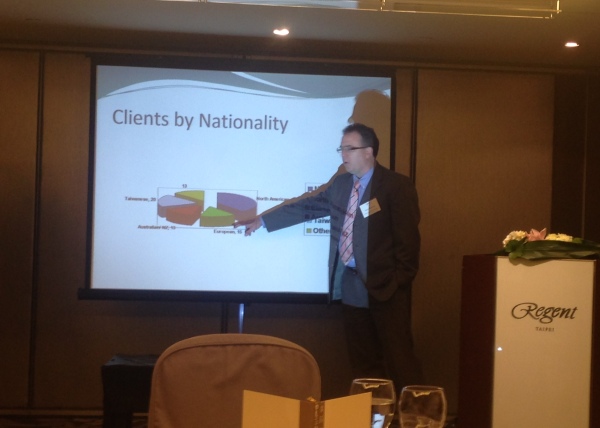Lunch with the Community Services Center

After two traumatic events involving murder and suicide shook the expat community in the late 1980s, the international community in Taipei's business and diplomatic leadership began searching for a solution to manage the resulting grief and prevent future tragedies. Ultimately they found an organisation in Cairo, Egypt on which to model their efforts. From that idea, money was raised for a foundation bond, facilities were secured, the first therapists were identified and recruited and the CSC was founded in 1987. According to McMillan, the institution in Cairo still exists and everything it does today, the CSC also still does.
The CSC is fairly well known in Taipei's international community for its "outward facing services". For example, it provides information on living in Taiwan in the form of brochures and maps for newcomers, publications including a monthly magazine and several resource books with details about how to find essential services and goods and various classes to help people find a sense of community.
However what is less well known is that, at its core, the CSC is a counseling provider. Staffed with 15 therapists, all with a minimum of a Master's degree in a mental health-related field, the Center facilitated over 2,700 counseling sessions last year with individuals, couples and families covering a broad spectrum of issues. People with anxiety, depression, relationship issues, substance abuse problems and behavioral issues have all found help from the Center's counselors in a safe and caring environment. A lot of clients are adults seeking help for issues relating to their children. McMillan also noted that a lot more 20-somethings are visiting therapists nowadays. His positive take on this is that young people today are more open and that there is less of a stigma associated with seeking help in the younger generation than in previous generations. Since CSC counselors are not psychiatrists (who are medical practitioners) they are not authorized to medicate. However, the CSC works with licensed psychiatrists for patients that require medication and provides counseling to those patients with psychiatric problems.
The CSC works closely with all six of the international schools in Taipei, providing professional help to children struggling with a wide range of challenges. The Center is uniquely positioned to provide counseling to students, especially those from the Taipei European School and Taipei American School, because counselors have in-depth knowledge and understanding of the unique environments of these schools. This is very important to understand the types of problems that students at these schools have to deal with.
Year to date, 3,100 sessions have been conducted. The Center also provides a crisis hotline. This year the Center has responded to 17 crises, up 300% from last year. McMillan attributes the rise in demand for counseling services not to an increase in mental health problems but rather to a growing awareness of the counseling services.
On the one hand McMillan said it was good that more people are aware of the counseling services. On the other hand, the rise in demand has stretched the Center's resources in terms of Counselors, therapy rooms and costs. While regular therapy sessions are arranged by the hour, dealing with crises follows no structure and can be very time-consuming. An average of 12 hours is needed to deal with each case. Moreover, providing counseling services comes with a cost. All the CSC's programmes are revenue positive except for the counseling services, which account for 46% of the Centre's total costs. While those that can afford it, pay for counseling services, the Center provides pro-rata and subsidised rates for those who are less fortunate. No one is ever refused counseling but, given stretched capacity, recently the Center has had to introduce waiting lists for the first time ever.
A growing demand for services would be a great problem to have for a business but, given that the CSC is a non-profit organisation, it relies on the continued generosity and support of its sponsors and the business community to continue to provide valuable services to the community.
